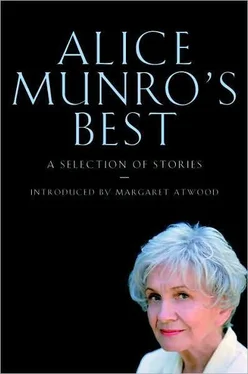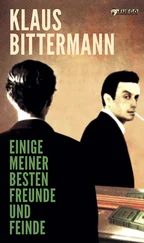Another thing the dressmaker said was “I thought now you was through school you’d be getting a job and help out at home.”
A woman walking down the hall stopped Rose.
“Aren’t you one of the scholarship girls?”
It was the Registrar’s secretary. Rose thought she was going to be reprimanded for not being at the meeting, and she was going to say she felt sick. She prepared her face for this lie. But the secretary said, “Come with me, now. I’ve got somebody I want you to meet.”
Dr. Henshawe was making a charming nuisance of herself in the office. She liked poor girls, bright girls, but they had to be fairly good-looking girls.
“I think this could be your lucky day,” the secretary said, leading Rose. “If you could put a pleasanter expression on your face.”
Rose hated being told that, but she smiled obediently.
Within the hour she was taken home with Dr. Henshawe, installed in the house with the Chinese screens and vases, and told she was a scholar.
SHE GOT A JOB working in the library of the college, instead of in the cafeteria. Dr. Henshawe was a friend of the Head Librarian. Rose worked on Saturday afternoons. She worked in the stacks, putting books away. On Saturday afternoons in the fall the library was nearly empty, because of the football games. The narrow windows were open to the leafy campus, the football field, the dry fall country. The distant songs and shouts came drifting in.
The college buildings were not old at all, but they were built to look old. They were built of stone. The Arts Building had a tower, and the library had casement windows, which might have been designed for shooting arrows through. The buildings and the books in the library were what pleased Rose most about the place. The life that usually filled it, and that was now drained away, concentrated around the football field, letting loose those noises, seemed to her inappropriate and distracting. The cheers and songs were idiotic, if you listened to the words. What did they want to build such dignified buildings for if they were going to sing songs like that?
She knew enough not to reveal these opinions. If anybody said to her, “It’s awful you have to work Saturdays and can’t get to any of the games,” she would fervently agree.
Once a man grabbed her bare leg, between her sock and her skirt. It happened in the Agriculture section, down at the bottom of the stacks. Only the faculty, graduate students, and employees had access to the stacks, though someone could have hoisted himself through a ground-floor window if he was skinny. She had seen a man crouched down looking at the books on a low shelf, further along. As she reached up to push a book into place he passed behind her. He bent and grabbed her leg, all in one smooth startling motion, and then was gone. She could feel for quite a while where his fingers had dug in. It didn’t seem to her a sexual touch; it was more like a joke, though not at all a friendly one. She heard him run away, or felt him running; the metal shelves were vibrating. Then they stopped. There was no sound of him. She walked around looking between the stacks, looking into the carrels. Suppose she did see him, or bumped into him around a corner, what did she intend to do? She did not know. It was simply necessary to look for him, as in some tense childish game. She looked down at the sturdy pinkish calf of her leg. Amazing, that out of the blue somebody had wanted to blotch and punish it.
There were usually a few graduate students working in the carrels, even on Saturday afternoons. More rarely, a professor. Every carrel she looked into was empty, until she came to one in the corner. She poked her head in freely, by this time not expecting anybody. Then she had to say she was sorry.
There was a young man with a book on his lap, books on the floor, papers all around him. Rose asked him if he had seen anybody run past. He said no.
She told him what had happened. She didn’t tell him because she was frightened or disgusted, as he seemed afterward to think, but just because she had to tell somebody; it was so odd. She was not prepared at all for his response. His long neck and face turned red, the flush entirely absorbing a birthmark down the side of his cheek. He was thin and fair. He stood up without any thought for the book in his lap or the papers in front of him. The book thumped on the floor. A great sheaf of papers, pushed across the desk, upset his ink bottle.
“How vile,” he said.
“Grab the ink,” Rose said. He leaned to catch the bottle and knocked it onto the floor. Fortunately the top was on, and it did not break.
“Did he hurt you?”
“No, not really.”
“Come on upstairs. We’ll report it.”
“Oh, no.”
“He can’t get away with that. It shouldn’t be allowed.”
“There isn’t anybody to report to,” Rose said with relief. “The librarian goes off at noon on Saturdays.”
“It’s disgusting,” he said in a high-pitched, excitable voice. Rose was sorry now that she had told him anything, and said she had to get back to work.
“Are you really all right?”
“Oh, yes.”
“I’ll be right here. Just call me if he comes back.”
That was Patrick. If she had been trying to make him fall in love with her, there was no better way she could have chosen. He had many chivalric notions, which he pretended to mock, by saying certain words and phrases as if in quotation marks. “The fair sex,” he would say, and “damsel in distress.” Coming to his carrel with that story, Rose had turned herself into a damsel in distress. The pretended irony would not fool anybody; it was clear that he did wish to operate in a world of knights and ladies; outrages; devotions.
She continued to see him in the library, every Saturday, and often she met him walking across the campus or in the cafeteria. He made a point of greeting her with courtesy and concern, saying, “How are you?” in a way that suggested she might have suffered a further attack, or might still be recovering from the first one. He always flushed deeply when he saw her, and she thought that this was because the memory of what she had told him so embarrassed him. Later she found out it was because he was in love.
He discovered her name, and where she lived. He phoned her at Dr. Henshawe’s house and asked her to go to the movies. At first when he said, “This is Patrick Blatchford speaking,” Rose could not think who it was, but after a moment she recognized the high, rather aggrieved and tremulous voice. She said she would go. This was partly because Dr. Henshawe was always saying she was glad Rose did not waste her time running around with boys.
Rather soon after she started to go out with him, she said to Patrick, “Wouldn’t it be funny if it was you who grabbed my leg that day in the library?”
He did not think it would be funny. He was horrified that she would think such a thing.
She said she was only joking. She said she meant that it would be a good twist in a story, maybe a Maugham story, or a Hitchcock movie. They had just been to see a Hitchcock movie.
“You know, if Hitchcock made a movie out of something like that, you could be a wild insatiable leg-grabber with one half of your personality, and the other half could be a timid scholar.”
He didn’t like that either.
“Is that how I seem to you, a timid scholar?” It seemed to her he deepened his voice, introduced a few growling notes, drew in his chin, as if for a joke. But he seldom joked with her; he didn’t think joking was suitable when you were in love.
“I didn’t say you were a timid scholar or a leg-grabber. It was just an idea.”
After a while he said, “I suppose I don’t seem very manly.”
She was startled and irritated by such an exposure. He took such chances; had nothing ever taught him not to take such chances? But maybe he didn’t, after all. He knew she would have to say something reassuring. Though she was hoping not to, she longed to say judiciously, “Well, no. You don’t.”
Читать дальше












